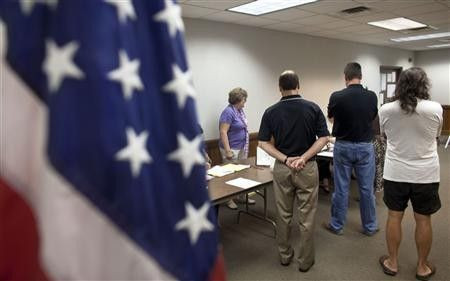Wisconsin Republicans stave off recall challenge

Republicans narrowly retained their majority in the Wisconsin state Senate on Tuesday, staving off a strong recall election challenge from Democrats and union members angered by a new law curbing the power of organized labor.
Two Democratic challengers ousted incumbent Republican lawmakers in special elections. But Republicans successfully defended four other seats up for grabs, denying Democrats the three victories they needed to seize control of the Senate.
Democrats hoped to regain control of the Senate to try to block Republican Governor Scott Walker's conservative agenda.
Walker, who has been uncompromising for much of his first year in office, struck a conciliatory note early on Wednesday following the election results.
"It's clear the voters ... want us to work together to grow jobs and improve our state. With that in mind, earlier this evening I reached out to the leadership of both the Republicans and Democrats in the Assembly and State Senate. I shared with them that I believe we can work together to grow jobs and improve our state," Walker said.
Democrats and organized labor forced the special elections, the largest ever group of recalls in United States history. They were galvanized by Walker's drive to limit the power of public sector unions and balance the state budget.
Ignoring massive protests, the Republican-led legislature earlier this year passed a law severely restricting collective bargaining of government workers and forcing union members such as teachers to pay more for health care and pensions.
The Wisconsin recall elections were closely watched for clues to the mood of U.S. voters after the bruising battle in Washington over the national debt, and months before the first primary votes are cast in the 2012 presidential elections.
Wisconsin is expected to be among a dozen or so closely-contested states in the presidential election. While the state voted for President Barack Obama in 2008, it swung strongly to Republicans in 2010, electing Republicans as governor, majorities of both houses of the legislature and a U.S. Senator.
Both Democrats and Republicans are expected to see the Wisconsin recall result as a victory. Republicans can boast that they staved-off a fierce challenge, while Democrats can say they have momentum as they try to recall Walker next year.
Wisconsin also was important for organized labor, which has seen its clout decline in recent years. Unions poured millions of dollars into the Wisconsin effort, and are also fighting to overturn an Ohio anti-union law in a referendum this November.
Spending on the nine Wisconsin recall elections had reached $33 million by this week, most of it from outside special interest groups. This far outstripped the previous Wisconsin state election spending record, with two more recall elections still to be held next week.
There have only been 20 state-level recall elections in U.S. history before this year and never nine in a single state. In addition to the six Wisconsin contests on Tuesday, a Democrat retained his seat in a Wisconsin recall election last month, and two more Democrats will face voters next week.
Outside of Wisconsin there have been two other significant recall elections this year. The Democratic mayor of Omaha, Nebraska survived recall, while the Republican mayor of Miami-Dade county, Florida was ousted. A senior Arizona lawmaker who championed a controversial anti-immigration law, faces recall later this year.
The Wisconsin contests featured saturation advertising and accusations of dirty tricks. Even as the final votes were counted on Tuesday, Democrats accused Republicans of tampering with the result in a Waukesha county near Milwaukee.
"Wisconsin should know that a dark cloud hangs over these important results," the Wisconsin Democratic Party said in a statement.
It may be more difficult for Democrats to break the grip of Republicans in Wisconsin next year after Walker on Tuesday signed into law a redistricting of the state's election boundaries that favors Republicans.
© Copyright Thomson Reuters 2024. All rights reserved.




















